1. Dudley Herschbach.
Choosing very challenging problems.
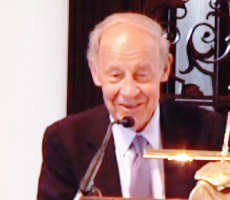 Dudley
Herschbach
Dudley
Herschbach.
Harvard chemistry professor.
Nobel Prize in Chemistry 1986.
"I’m glad to welcome you to this Celebration, because it is a
celebration. I’m sure Bill, if he were here would be
absolutely delighted with the music we’ve just heard and that we
will be hearing. He’d also be delighted to learn that the
speakers will have to emulate some protein folding and unfolding
to get from where they are to here [the podium].
My role is to give brief introductions to the speakers. As
you see in the program they will be interspersed with musical
performances. You will hear from the very last speaker,
David Lawton, about Bill’s devotion to the Music House Party, and
this [celebration] he would think of, I think, as another episode
of the Music House Party. But the speakers between will give
us plenty of reasons to appreciate why this is really a
celebration. Of course, we all know the legacy of immense
scientific achievement that Bill has given us.
Few can match his earnest and intense devotion to science and his
ability by choosing very challenging problems to make major
contributions. But everyone can appreciate the significance
of that work and what it means to pursue it and the way Bill
Lipscomb did, but there are many other dimensions that you’ll hear
about from memories and music today.
I will introduce the speakers in the groups you see in the
program, which is to make it brief, and since it takes a while to
do the “unfolding” and make your way up here I might suggest the
speakers might start moving [early]…. It’s a wonderful collection
of speakers. You’re bound to get a wide range of
perspectives of Bill Lipscomb’s life. Our speakers range in
age from 88 to 22. That, like the music we have here, is a
pretty special thing for this kind of event."
2. E. J. Corey. Bill’s wide
interests were important for him as a scientific adviser.
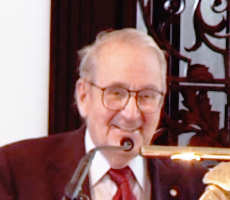 E. J. Corey
E. J. Corey.
Harvard chemistry professor. Nobel Prize in Chemistry
1990.
"Our first speaker, as you see, will be E. J. Corey…. He’s
[been] a colleague of Bill’s for more than 50 years, likewise a
chemist of immense, indeed epic, accomplishments.
I heard just a few moments ago a story from E. J. that I have to
tell you. They made many trips together back and forth to
Texas to serve on the advisory board of the Welch
Foundation. They sat in adjacent aisle seats and talked
back and fourth of course the whole trip. E. J. said some
very interesting things came from those conversations, and in
particular there were interesting reactions by the neighbors
often. He mentioned one case of a lady who said how
impressed she was with the enthusiasm of you two high-school
teachers. I’m sure Bill enjoyed that as much as E. J.
did."
Speech by E. J. Corey
"Thank you very much Dudley. It is a real honor to be
here to celebrate the life of a wonderful human being and a very
good friend.
As Dudley mentioned, Bill and I were colleagues, friends, I
would say even close colleagues and friends for more than 50
years at Harvard. In fact we started as faculty members at
Harvard within a few days of one another in July of 1959.
We’d known one another before that time, and we’d corresponded,
usually corresponded about scientific things, and I’d got to
have a very deep respect for Bill as an outstanding structural
chemist. In fact, at that time I was at the University of
Illinois, and I lobbied from my lowly, youthful position to get
my colleagues interested in hiring Bill from the University of
Minnesota.
Bill and I were very close and drawn together in many, many
ways, and it’s impossible for me to even give you a brief
summary of them all. It’s hard to compress a half a
century into five minutes. But I’ll start by saying that
Bill was a kind of model for me. We shared the teaching of
a new course that was started at Harvard around 1961. It
was a course for hand-picked Harvard undergraduates, Freshmen
and Sophomores, that compressed three years of chemistry into
two. Bill taught the first semester, Frank Westheimer the
second. I taught the third, and Bright Wilson taught the
fourth semester. Bill made such a profound impression on
the students, and they so admired him as a teacher that it was a
big challenge for me to sort of pick up and carry on that
relay. Bill was a really great teacher. He made
things very clear, and I have that on the account from many
students, and he was not afraid to teach complicated things to
these Freshmen, from quantum theory, to group theory, to
structural theory, x-ray crystallography, very advanced
subjects, and the students loved it. Bill had an
enthusiasm that was transmitted naturally to those
undergraduates, and, I learned later, also to his graduate
students and post-doctorals. It was … unique I thought and
something very special to Bill. Of course he knew what he
was teaching backward and forward. Bill and I did, I
think, a pretty good job with that course, as well as [did] the
other two members of the faculty. Out of that class came
many, many successful academics and scientists who went in other
directions, including two Nobel Prize winners.
Bill had remarkable talents as an administrator. He was a
great chairman of our department from 1963-1966 I believe, and
he ran meetings in a very precise, orderly, and business-like
way, and everyone pitched in and did what they could to ensure
that the department would remain a really true first-rate
teaching and research unit. Bill was always devoted to the
department and always cared about keeping it at the very top of
its game.
As Dudley mentioned, Bill and I for more than 20 years were
members of a scientific advisory board for a foundation in
Texas, and we took innumerable plane rides together. I had
other stories about those plane rides that I could tell you, but
I think I’ll just tell you one. As Dudley said, we talked
non-stop on those plane trips, and across the aisle there were
some amusing comments from our fellow passengers, totally
unpredictable usually.
Bill was one day telling me about his experiences as a graduate
student at Caltech with Linus Pauling, and he happened to
mention the fun he had playing [a]
softball [variant of baseball: softball pitched overhand
from 57.5 feet with 75 feet between bases and hardball rules],
and one particular game gave him great pleasure. It was a
game when he played shortstop and single-handedly pulled off a
triple play. I think it was a line-drive to shortstop, who
then [got] the runner going from second to third [by stepping on
second base], and then [tagged] a runner [from first] who wasn’t
really observing what was happening before he went in to
second. So, one of the people in the plane who heard that
got up and came back to us and said, “What league did you play
in?” [Bill gives his account of his unassisted triple play
here]
Bill was one of the most amazing chemists I’ve ever known,
because he had such wide interests. He followed physical
chemistry structural chemistry, structural biology,
biochemistry, a certain amount of mechanistic organic chemistry,
reaction theory and structural theory, and on top of that he was
very interested in cosmology and new developments in physics,
and he could go on for hours, talking about things he’d just
read. That breadth of knowledge was very, very important
to his success as a scientific adviser to the Welch Foundation.
I think Bill probably had a bigger impact on that group than any
of the other members. He did his homework more thoroughly
than any of the rest of us and came really well prepared, but
beyond that he knew so much about so many things that he was
just an invaluable guy [for] the right decisions in many, many
cases.
Bill had a lot of interests in many of the things I was doing,
and we collaborated over the years on various projects. I
think they were mainly in the area of x-ray
crystallography. But it was a very useful interaction, and
of course it’s recorded in the scientific literature. It
was very easy to get Bill interested in a scientific problem,
and usually, once he got interested, he really could make a
major contribution.
Bill and I also had a common interest in music, so that we could
talk about that.
Bill had a series of offices. After his first office on
the third floor of Gibbs, he moved to another office on the
second floor. Then he made a series of moves in the main
chemistry building and finally wound up on the third floor,
across from my office. So there, we saw a lot of one
another, and we had numerous discussions and conversations,
which I think we both enjoyed, and which I found to reveal
another side of Bill that was not so easily apparent at
first. He had an intense interest in the future of
chemistry and wanted always to find out my impression of where
things were going, what the problems were, and what the outlook
was. Bill was very forward looking. I don’t think he
ever looked back, and he believed in Harvard as a great
institution, chemistry as a wonderful discipline, and he cared
very, very deeply about the future of this place and our
department.
I will very much miss Bill. He was a wonderful, wonderful
human being, an outstanding talent, a great friend, and I join
with you in remembering him and celebrating the wonderful life
that he lived. Thank you."
Corey's Publications with Lipscomb
Corey, E. J., Cooper, N. J., Canning, W. M., Lipscomb, W. N.,
and Koetzle, T. F., "Preparation, Unusual Spectral Properties,
and Structural Characterization of (Terpyridine)
(tetrahydroborato-H,H') Cobalt," Inorganic Chemistry 21, 192-199 (1982).
Schomburg, D., Hopkins, P. B., Lipscomb, W. N., and Corey, E.
J., "Total Synthesis of Erythromycins. 6. Facile Transformation
of Erythronolide A into a Tricyclic Internal Ketal," J. Org. Chem. 45, 1544-1546 (1980).
3. Eric Gouaux. Bill's
dream of being a physicist not possible: in physics he could not
make mistakes fast enough.
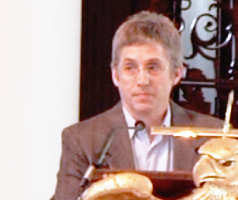 Eric
Gouaux
Eric
Gouaux.
Former student. Biochemist at the Howard
Hughes Medical Institute and Senior Scientist at the Vollum
Institute of Oregon Health & Science University.
"Our next speaker will be Eric Gouaux. He first came to
Bill in the 1980s when Eric was an undergraduate and later in
graduate work as a Ph.D. [student] at Harvard.
He’s now a Howard Hughes Investigator, a very special thing, the
Oregon Health and Science University. He works in a field
dear to Bill, crystallography and visualization of
molecules. He describes his current research as, “Mapping
molecules that ring and run.” These are neuro-transmitters
in our brain and nervous system. He says, “Neurons need to
press each other’s doorbells and get out of there fast.”
Again, I’m sure Bill would like that."
Speech by Eric Gouaux
Graduate student 1984-1989.
The Colonel’s lab.
Not Professor, or Dr or William or Bill
It was the Colonel.
Early morning, after lunch, late at night
Yellow post-it notes, on my desk.
“The Colonel stopped by”, signed “The Colonel”
Always around
Questions, queries, comments, critiques, simple suggestions,
flashes of insight.
He taught equations
Theories, molecules and mechanisms
Elegant tricks, folksy remedies
One never knew if it was
The genius scientist, gifted musician
layered on the prankster Kentucky boy
Or the other way around
We had Gibbs, it had us.
3 stories of brick, apart from rest
A lab, a house, a home
Experiments, ideas, dreams and fears.
Here we worked, ate, bantered, napped and worked again
It was a shelter, a home, an incubator, a sort of nest
A refuge
Always under the Colonel’s fierce protection
At the beginning he was a mystery
A towering fountain of knowledge and wisdom
Immutable, perfect
But then we learned
He taught us, about science and about himself.
He admonished us - make mistakes!
Quickly!
And to then move on.
His dream, of being a physicist, not possible, he said,
Because he could not make mistakes fast enough.
So chemistry was chosen.
We realized, he is human!
And from that, we learned,
Make mistakes
Quickly.
And what to do? He spoke like an archeologist.
It’s where you dig.
And the beauty of his presence
Was that he let us
Find our own places to dig.
And when it was time to leave
Depart from Gibbs
Go out on our own.
He encouraged us, trusted us
more than we trusted ourselves
And in doing so gave us the faith to succeed
Venture out on thin ice
Up steep cliffs
Far out to sea
But it was long after my departure
And then a sorrowful return
For the memorial service of Don Wiley,
The Colonel’s graduate student and chosen successor
It hit me gale force
When the Colonel said, upon acknowledging
The death of Don
That it was like losing a son
Because now I know
Full well
That I have lost a father"
Gouaux's Publications with Lipscomb
Kosman, R. P., Gouaux, J. E., and Lipscomb, W. N., "Crystal
structure of CTP-ligated T state aspartate transcarbamoylase at
2.5 A resolution: Implications for ATCase mutants and the
mechanism of negative cooperativity," PROTEINS: Structure, Function, and Genetics 15, 147-176 (1993).
Gouaux, J. E., Stevens, R. C., and Lipscomb, W. N., "Crystal
Structures of Aspartate Carbamoyltransferase Ligated with
Phosphonoacetamide, Malonate and CTP or ATP at 2.8-A Resolution
and Neutral pH," Biochemistry
29, 7702-7715 (1990).
Stevens, R. C., Gouaux, J. E., and Lipscomb, W. N., "Structural
Consequences of Effector Binding to the T State of Aspartate
Carbamoyltransferase Crystal Structures of the Unligated and
ATP- and CTP-Complexed Enzymes at 2.6-A Resolution," Biochemistry 29, 7691-7701 (1990).
Gouaux, J. E. and Lipscomb, W. N., "Crystal structures of
phosphonoacetamide ligated T and phosphonoacetamide and malonatc
ligated R states of aspartate carbamoyltransferase at 2.8 A
resolution and neutral pH," Biochemistry
29, 389-402
(1990).
Gouaux, J. E., Stevens, R. C., Ke, H., and Lipscomb, W. N.,
"Crystal structure of the Glu-239 to Gln mutant of aspartate
carbamoyltransferase at 3.1 A resolution: An intermediate
quaternary structure," Proc.
Natl. Acad. Sci. USA 86,
8212-8216 (1989).
Gouaux, J. E., Lipscomb, W. N., Middleton, S. A., and
Kantrowitz, E. R., "Structure of a Single Amino Acid Mutant of
Aspartate Carbamoyltransferase at 2.5 A Resolution; Implications
for the Cooperative Mechanism," Biochemistry 28,
1798-1803 (1989).
Gouaux, J. E. and Lipscomb, W. N., "Structural transitions in
crystals of native aspartate carbamoyltransferase," Proc. Natl. Acad. Sci. USA
86, 845-848 (1989).
Gouaux, J. E. and Lipscomb, W. N., "Three-dimensional structure
of carbamoyl phosphate and succinate bound to aspartate
carbamoyltransferase," Proc.
Natl. Acad. Sci. USA 85,
4205-4208 (1988).
Gouaux, J. E., Krause, K. L., and Lipscomb, W. N., "The
catalytic mechanism of Escherichia
coli aspartate carbamoyltransferase. A molecular
modelling study," Biochemistry
and Biophysics Research Communications 142, 893-897 (1987).
4. Jim Lipscomb. Eldest
son. Swingle accident. Forgiveness.
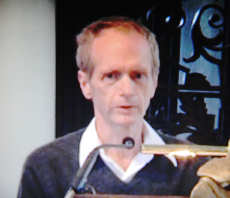 Jim Lipscomb
Jim Lipscomb. Son.
Senior Software Engineer at IBM.
"Our third speaker in the first group is Jim Lipscomb, Bill’s
son. Among much else, he’s pretty good at mapping molecules
too. He received a Ph.D. in 1981 from the University of
North Carolina, and I was delighted to see that his thesis was
titled
Three-dimensional cues for a
molecular computer graphics system.
A major part of his career has been with IBM. He’s created a
superb
website [(this
website)] that describes many dimensions of Bill’s life and
includes a lovely
photo album
as well as a
gallery of molecular
[models]."
Speech by Jim Lipscomb
"The website ... is open to anyone.
Send me your memories
of Bill and I shall find a place for them [here, on this website].
...."
Jim continued with short versions of three stories from his
Eulogy,
- Eldest Son, He lived
for two hours.
- Swingle Accident,
Bill's attempt to save the life of Elizabeth Swingle.
- Forgiveness.
Forgiveness to the son. Forgiveness to the father.
5. Stan Ovshinsky. Bill
the riff-ster in science, music, art, and comedy.
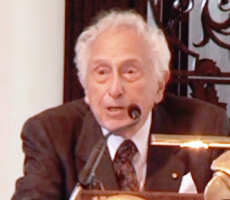 Stan
Ovshinsky
Stan
Ovshinsky.
Inventor. Associate of Bill
starting from Minnesota days. Founder of Energy
Conservation Devices.
"As you see, our next group of speakers is headed by Stan
Ovshinsky. He is really a very remarkable fellow, eminent
inventor and scientist, over 400 patents, mostly in the area of
energy and information. Many of you may not be aware of it,
but one of these involves the nickel metal hydride battery that is
widely used in laptops, digital cameras, cell-phones, and electric
and hybrid cars.
Stan is the founder of the Energy Conservation Devices Company in
Detroit, to which Bill long enjoyed serving as a consultant.
I think you’ll get a glimpse why Bill enjoyed it so much when Stan
speaks to us."
"I’m sure that many will wonder how Bill and I got together,
because it’s really something that shows what he was like that has
been alluded to by others. Like me, Bill did not pay a lot
of attention to … areas and disciplines in science, he always
being interested, always being active, and always contributing in
any area he felt like it. Of course they are all
connected. They’re science. [Bill] thought too that
science is the way for the planet to overcome some of the terrible
problems that lay before us, and so he would say, “Well, God
didn’t make disciplines, man did.” In those disciplines we
[met] by having mutual friends.
He was interested so much in basic new physics and
chemistry. Anything that was fundamentally possibly
important he could discuss, as Professor Corey said. That
was one of the great things about him. When he would come to
our home, he would just relax and we’d talk about everything and
anything, not really primarily science and technology, but I [have
a musician] son who is in the San Francisco Symphony, so [Bill]
would always bring his clarinet, at first just to play for us, and
then he’d play duets, and then with friends of my son he would
play with a group. The sound was so was so dear and precious
to remember, because he was as serious about playing and as
talented about playing, as he was in science. [Bill had]
excitement for new, fundamental happenings in the field, and I was
doing something absolutely new in science (in physics, and in
material science, including chemistry) and so if any of you drive
Priuses or any of the … Toyota or the … Honda or the Ford hybrids,
Bill [had a hand in] those cars, because we, together, enabled
what our society needed, … electric and hybrid vehicles.
[Bill was] a great source of strength to me, because even though I
was a scientist, when you do something new, you are often not,
[well,] it isn’t a happy time, so he was always there for
encouragement, … telling about what he did and how he did it, …
being supportive. ….
If I was to get serious about Bill, I would have to say he
represented the aspirations and potential that’s inherent in
humanity. That was a kind of full-blown person he was.
[Bill] was full of joy and spontaneity. We talk about how he
[played] serious music, but he loved jazz as well. I don’t
know if many of you knew that he was a friend of
Dizzy
Gillespie .... He showed the excitement and showed the
incredible way of appreciating art and artists, of whatever kind.
In my mind, as well as his, we were very close friends for many
years, and … a symbol [of] Bill [is that] his riffs, like he would
in jazz,
appear in his serious
scientific work. He’s a riff-ster: … He suddenly comes
out [at the
Ig Nobel Prize
Ceremony], and there he is, and you’re laughing, and you’re
enjoying it, … as … Viki [Victor] Weisskopf of MIT [and former
head of CERN] once said, “The joy of science.” He represented
pleasure and continuous learning.
He was a marvelous and dear, dear friend, and it was wonderful to
get together with him and Jean. She meant so much to him, as
you all know, and to his life, and added to it, and he was a happy
man. So there’s no way [to] express joy and mourning at the
same time, but he could, and so I would rather that we remember
and mourn and remember the meaning of joy that Bill
represented. I feel honored to speak about him, and I speak
from the bottom of my heart. Thank you."
6. Janet Conrad. Bill’s room
was a disaster area. The Yes-bell Uncle.
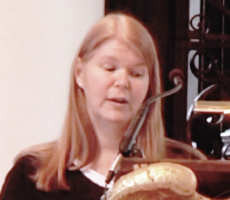 Janet Conrad
Janet Conrad.
Niece, also representing Bill's sister Ginny. MIT
Physics Professor.
"Our next speaker in this group is Janet Conrad, professor of
Physics at MIT now, but earlier than that she began life as Niece
of Uncle Bill Lipscomb, daughter of the youngest sister of Bill.
I heard from here in our gathering before [the Celebration] the
stories of how her mother and Bill got in trouble by taking apart
their precious grandfather clock that her mother later inherited
and it never worked again, so I guess another grandchild will need
to take on that project.
But Janet is not a student of molecules. Instead, her work
deals with neutrinos. They’re ghostly particles.
They’re very shy. They don’t interact much with anything
else, even though the universe, as Janet likes to point out,
contains far more neutrinos than atoms. But she says, “When
you study neutrinos, you never lack friends. They’re all
your friends,” and that’s something you can meditate on."
Speech by Janet Conrad
"I will begin by reading a few words from my mother, Virginia
Lipscomb Conrad, William Lipscomb’s youngest sister. She cannot be
here today due to health reasons; however, she wanted me to share
with you some stories about growing up with Bill. As you can
imagine, life with Bill was always an adventure! He always had
spirit! I will read what she has asked me to say, and then share
with you my own memories about my Uncle.
Let me begin with my mother’s words:"
Virginia Lipscomb Conrad
"We lived on an average street in Lexington Kentucky in a house
that was full of love and music. We were blessed with great
neighbors, many associated with the University of Kentucky. It was
a neighborhood where the children played together, and everyone in
our group grew up to have successful careers – many in academia,
like Bill.
Bill’s room was a disaster area as far as his mother was
concerned. In addition to a sizable chemistry laboratory, there
were collections of such objects as old radios, Indian arrowheads
from a nearby forest, and a series of wishbones arranged in order
of size on the wall.
In our side yard there were large trees. Bill improvised a rope
swing, a suspension bridge between two trees, and a tree house for
all of us to enjoy. Also, nearby our home was a deserted chicken
house that became a play place. Bill saw to it that the boys had
sole possession at all times by spreading an evil smelling
concoction that drove little sisters away.
Bill liked to create his own fireworks to entertain us on the
fourth of July.
Many of you know how he loved to play tennis. There was a vacant
lot next to the house. Bill and the bigger boys carefully took up
the sod for a tennis court. There was an old-fashioned
steam-roller repaving our road that summer. The driver rolled the
court flat for us. Unfortunately, at the end of the summer, the
owner of the lot showed up. He was not amused and that was the end
of our tennis court.
Tragedy struck our family in 1937 when our sister Helen suffered
polio, followed by complications. By this time, Bill was attending
college at the University of Kentucky on a music scholarship.
Almost every day during the months of Helen’s illness, Bill would
walk up to the hospital to see her. They were very close and both
were superb musicians.
In 1941, Bill graduated from the University of Kentucky. He kissed
us goodbye and hitchhiked all the way to Cal Tech. The rest, of
course, is history.
But while his science became a consuming passion, he remained
close to his family. For me there was an important moment when
Bill made a special effort to make it to my wedding. He brought
our sister Helen, my maid of honor, down the aisle in her wheel
chair."
Janet Conrad
"My mother’s remembrances resonate with me, because I have very
similar stories about Uncle Bill. He had this spark that made
everything more fun, special, and just better. There’s no question
that he was my favorite Uncle. I have thought that since I was
small - when I got to know Uncle Bill while my family lived in
Boston when I was five years old. However, the example I would
like to start with happened when I was in 7th grade.
Uncle Bill had just won the Nobel Prize, and this was in the local
news. My friends congratulated me because my uncle won a “noble”
prize. We thought this was really great – he was going to be noble
– maybe a duke or an earl! When mom heard this she corrected me.
It’s pronounced no-bell, not noble. No-bell. So when Uncle Bill
called up, I got on the phone and very carefully said,
“Congratulations on your No-bell Prize.” He paused for a moment
and said to me: “Can you believe it? All that work and then they
don’t give you a bell!” I thought that was really funny. I
responded “Yeah, and they don’t give you a dukedom either!”
This became a joke between us. No-bell is just so negative. It
ought to be the Yes-bell Prize. So much more positive! Since this
prize was not already assigned, we could decide what it would be
for. I decided the Yes-bell prize is for excellence in uncle-hood.
What does it take to be a Yes-bell Uncle? Well, you have to be
better than the best. Best Uncles loan you their apartment in
Cambridge for the summer when you are in college. And when you
become a grad student at Harvard, the Best Uncles will cart
furniture out of their basement and over to your student-slum
apartment to make it livable. And Best Uncles will play the
clarinet masterfully at your wedding. Uncle Bill did all of that.
But Uncle Bill was better than the Best Uncle, and that’s what
gets you a Yes-bell Prize.
The Yes-bell Uncle tries to help you with your quantum mechanics
homework when you are in graduate school. And you know what? He
couldn’t solve those problems either! This made me and my friends
feel much better.
A Yes-bell Uncle makes you look really good as a postdoc. When I
was a postdoc, my first job was to understand why a detector had
quit working. When I removed the very reactive liquid in the
detector, I discovered that, rather than clear, it contained green
flakes. I called Uncle Bill and he said - “that sounds like copper
reacted with the liquid - do you have any copper tubing?” I didn’t
think so, but nevertheless, I walked in the next morning and said
“it’s copper.” People said “no, there is no copper here! We built
this carefully.” But when we took it apart, what do you know?
There was one copper-joint. Uncle Bill made me look like a star.
And a Yes-bell Uncle wants to talk about your research with you,
not to seem interested but because he IS interested. When I came
to MIT to give my colloquium as I was considering moving from
Columbia to MIT, there was Uncle Bill in the audience. Yes, he had
come to support his niece -- that’s what Best Uncles do. But he
also came because he wanted to hear what I had to say. He was
genuinely interested. The Yes-Bell uncle shares your interests.
A Yes-bell Uncle is a kindred spirit.
It was his spirit that made Bill Lipscomb so special. The spirit
he shared with my mother, and with me, and with Aunt Jean and
Jenna, Jim and Dorothy and everyone else. He was a person with a
wonderful spirit. And so, what Mom and I and my sister, Jean, and
my whole family want to say is: Thanks Bill for sharing that
spirit with us."
7. Jenna Lipscomb. No
different from anyone else's family. Or so I thought.
"Our third speaker will be very special the perspective of a
22-year-old person, about to graduate from college, and she will
actually be introduced by her mother. [They are] of course
Jean and Bill’s daughter.
I look forward to this, because I have enjoyed so often
episodes, meeting, sharing things with Bill, and many times that
included Jean. She’s so wonderfully gracious and
vivacious. I remember that often for years now [she would]
like to update me on Jenna’s activities. I look forward to
that aspect too."
"Hello everyone. Welcome and thank you for coming today.
I especially would like to thank Bill for having such an amazing
group of colleagues, friends and family. Your presence in his
life has made my experience with him a very rich journey. Living
with Bill these last 37 years has not been exactly restful, as
you might well imagine, but the adventures have been wild,
wonderful and totally remarkable.
Before I say a few words about Jenna and Bill, I want to thank
Jenna for being such a great comfort and support to me these
last few months. She has definitely been the good daughter. And,
at age 22 she has become the young woman that all parents hope
and pray for when their child is a teenager!
Jenna was the delight of Bill’s later years. It was apparent
from the beginning that I was going to have to negotiate with
Bill to “hold the baby.” He hogged her unmercifully from me.
Bill’s lap was always home base for Jenna as she was growing up.
At most social gatherings you would find the two of them sitting
on the floor, Bill cross-legged with Jenna in his lap. The home
base theme grew into real live baseball then softball. When
Jenna bypassed little girl softball for Little League Baseball,
he was thrilled to be the Dad on the front row rooting for the
only girl on the team. Bill reminded us from time to time about
his dazzling unassisted triple play as a graduate student at Cal
Tech earning him a headline in the Pasadena local newspaper.
Sixty years later, Jenna was recruited to play softball at
George Mason University and, in her own right, remains a
crackerjack shortstop and second baseman.
Definitely her Daddy’s girl….."
Speech by Jenna Lipscomb
"Growing up, being the daughter of a Nobel Laureate was no
different from anyone else's family. Or so I thought. I mean, I
didn't know any better. I thought jet setting across the globe,
going to conferences and being around all of these world renown
scientists was normal. Obviously, when I look back on my life,
it was the farthest thing from normal, but then again, whose
family is. When I was a child, I didn't even know what a Nobel
Prize was. I remember once when I was really little, my mom gave
me a thin chocolate doubloon in a gold wrapper, a replica of the
Nobel Prize, and told me that was what Daddy had won. I was
clearly not impressed with the fact that my dad had won a piece
of chocolate.
My father had many different quirks, which I'm sure many of you
have witnessed over the years. One specific memory I had was of
my seventh birthday. He brought home a bucket of liquid
nitrogen, sat down all of the kids in front of our kitchen
counter and then proceeded to put a banana and flower into the
bucket. Now, as most of you know, liquid nitrogen is a very
powerful substance and instantly froze both objects. Mind you,
he had on his white lab coat and goggles. He began to fish out
the banana and flower with a pair of tongs and all of us kids
thought they were still the same as when then went into the
bucket. Well, he suddenly let go of the two and they smashed to
the ground in a million pieces. My mom would describe the
children having a look of horror yet infatuation over what had
just happened. I’m pretty sure at most kid’s seventh birthdays
they did not get a show with liquid nitrogen.
Another oddity my father had was his sense of nutrition. He
never allowed me to have fast food, any kind of burnt food
(because the burnt marks might contain carcinogens), or anything
remotely bad for you. But I was a picky eater. When I was in
grade school he became desperate enough at breakfast time to
allow me to eat hot dogs or chicken nuggets with lots of ketchup
and tiny frozen waffles piled high with whipped cream just to
make sure I ate “a good” breakfast. If I've ever been over to
one of your houses now you know why I choose to have hot dogs or
pizza for breakfast, instead of the normal, eggs, cereal or
pancakes.
Over the years, I came to realize that it was not just a piece
of chocolate that he’d won, but it was actually something quite
exrtarodinary. It was not until recently that I finally
understood why every time we would go on a trip or to a meeting,
people just fawned over him. Many people have come up to me
after finding out about my father and saying that I must be
amazing at chemistry and math. Most of you know that is
absolutely not the case and I am actually rather terrible at the
both of them. He obviously hasn’t given me his talent in the
sciences, but what he has given me is so much more. He taught me
how to have passion in everything I do; how to care for the
others around me, but most importantly, he taught me how to
love."
8. Marc Abrahams. Bill was
game for anything, and he could make anything work.
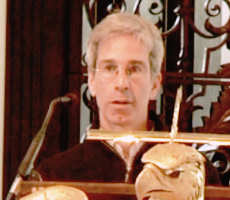 Marc
Abrahams
Marc
Abrahams. Editor of the
Annals of Improbable Research
and organizer of the
Ig Nobel
Prizes.
"Our next speaker I’m sure, like all of us, was delighted to hear
about the Yes-bell. Marc Abrahams, as many of you know, is
the editor of a magazine called [Annals of] Improbable Research,
in fact I think a company named that now, which compiles funny
stories about actual research, even conducts some, and every
October now at Harvard in Sanders Theater holds the Ig Nobel
Ceremony. Over the 20 years that this has gone on it’s
become quite notorious. It may get more publicity now than
the Alfred Nobel Prize. The Alfred Nobel Prizes are
announced earlier and earlier and it seems that they are trying to
get out the news before Ig Nobel is held.
In any case, Marc is a remarkable fellow in many other ways.
He was a Harvard undergraduate. He got his Bachelors degree
in Applied Mathematics, class of 1978. He likes to point out
now that there was another fellow in that program, who was in the
class of 1977 but dropped out, Bill Gates. Marc worked in
computer software for some years, optical character recognition,
working for a time with Kurtzweil on work that enabled blind
people to do much more.
....
Bill was an avid participant for all the years in the Ig Nobel,
and I think he was a member of the editorial board of the Annals
of Improbable Research from its inception somewhat earlier."
Speech by Marc Abrahams
"Bill, I think, would have liked the idea of all these people
coming up and riding some kind of big eagle to talk about
him. He enjoyed the unexpected combinations of things.
I met Bill about 20 years ago. I had become the editor of a
magazine that’s about funny things in science, and I got to meet a
lot of eminent scientists and a lot of not-at-all eminent
scientists, and a lot of the eminent ones would point me to some
of their peers who had a good sense of humor, who might enjoy
being interviewed and asked unusual questions, and quite a few of
them mentioned Bill Lipscomb, but then they all said pretty much
the same thing immediately, as if it was a thought that
automatically followed the, “Oh, you should talk to Bill
Lipscomb.” part. And I remember that Dudly [Hershbach] was
one of these people too. They’d say, “Go. Bill
Lipscomb has a great sense of humor. You should go talk to
him.” And then, “Well, but on the other hand, now don’t …” They
would always say this, “…. don’t take this personally. I
don’t mean it that way, but he doesn’t suffer fools gladly.”
And I didn’t quite understand this, and I was intimidated, so for
a year or so I didn’t call Bill, but after a while, because more
and more people were telling me about this guy, Bill Lipscomb,
with this sense of humor, I decided, “What can he do? The
worst he could do is yell at me.” And that’s not a terrible
thing.
So I screwed up my courage, and I got [Bill's] phone number and I
dialed the number, and he answered the phone, and I told him who I
was, and he said, “I’ve been hoping you’d call me.” And he invited
me over, and we became fast friends and very quickly became
collaborators in an awful lot of ways. A lot of what we were
doing was making people laugh about things in science, but
underneath a big part of it also was being really sneaky about
getting non-scientists to become curious about what all this
science stuff is, and getting scientists in “that” field to become
curious about what the scientists down the hall in “this” field
are actually doing, because they don’t speak language often.
We had this thing called the Ig Nobel Prize Ceremony every year,
which is this gigantic show with all sorts of things involved, and
Bill from the very first moment became more involved than anybody
else, and he became in a way the heart and sole of this
thing. He was game for anything, and he could make anything
work. We had Bill dancing in a ballet, the Interpretive Dance of
the Electrons. We had Bill singing in operas, doing all
sorts of things. Keep in mind that for some of these things,
especially the ballet, he didn’t know we were doing a ballet until
about two minutes before he was on stage with this ballet corps,
but he was wonderful. You can see in the still photographs,
there’s just this immense life and motion in there.
He had a sense of timing that was so good that you almost wouldn’t
notice it. And it was only we who were putting the show
together who would notice often that the audience would be
responding to him, even if Bill was just standing there,
supposedly doing nothing people were laughing, and it wasn’t an
accident. He was causing this. He was causing this
quite consciously, and you could not describe it. I have
been thinking about this for 20 years, and I can still only
describe it in this rudimentary way: It’s like a really great jazz
singer who if that singer is singing even just a single note it
sounds beautiful, and you try singing that same note back to
yourself the same way, and you realize that there is so much going
on in that one note that you can’t begin to understand everything
there. And that’s the way Bill was. And I can’t even
describe what it was. It wasn’t just a note, it wasn’t just
talking, it was everything.
I want to read you a couple of things that are Bill. As part
of the [Ig Nobel] Ceremony we sometimes had little tiny
speeches. These were designed as things that would be a star
turn for various people.
We had a thing we called the Heisenberg Certainty Lecture.
Many of you know about the Heisenberg Uncertainty Principle, and I
should tell you this story, because nobody else did: Bill loved to
tell that he was at a dinner (I think that Jean [Evans] was there
too) years ago in Germany probably, and he found himself seated
next to Mrs. Heisenberg, the widow of Werner Heisenberg, for whom
the Heisenberg Principle is named, and she introduced herself to
Bill, and she said, “I am Mrs. Heisenberg.” And Bill looked
at here and said, “Are you sure?” [Bill wrote this story up,
number 24 on the list, in his unpublished manuscript
Humor In Science and in
Aesthetic Aspects of Science. -Ed.].
One year we asked Bill to do one of the Heisenberg Certainty
Lectures. And the deal on this was that if we invite you to
do one of these, you can talk about anything you want, but you
have to do it in 30 seconds. I don’t even remember what the
topic was, but this is what Bill said. The topic doesn’t
really matter. This was in 1994. The landscape has
changed a little bit, so put your mind back in 1994.
Whatever his topic was, he said, “The following statement of the
Heisenberg Certainty Principle is dedicated to the United States
Congress. If your position is everywhere, your momentum is
zero.” If that didn’t make complete sense to you, just talk
to somebody who is laughing, who is undoubtedly a scientist, and
they will be really happy to spend the next four hours explaining
the background.
I brought one other thing. …. If you’ve come to the Ig Nobel
you know that Bill became more than just the Bill Lipscomb known
to his family and friends. He became a character known as
Professor Lipscomb, which was completely true to everything that
he was, it was just ever so much more so. And he was a
beloved figure. And it carried over, not just on the
stage. It turned out that we could do this in other
places. Several times he and I would do interviews. He
and I would sit together, and I’d ask him questions, and he would
come up with answers, and we would tape-record them, and I’d
transcribe them. This was little pieces of an interview we
did in 1999 on the subject of tea, because Bill liked to drink tea
quite often. I’m going to be reading you this. Part of this is
what I was saying and part of it is what Bill was saying.
I’m not going to try to imitate Bill, because I can’t. ....
I should mention: We concocted this stuff, so the whole idea of
this thing was, “I’m going to ask you some questions, and whatever
I ask, you just be very nice, and you offer me tea, and you be a
real pain, so I can’t even finish the interview,” And [Bill]
said, “OK.” And so keep in mind that we were just making
this up, and in fact it was my idea for him to ask me this
question, however he was so good at it that I kept
forgetting. Every time he would ask me if I wanted tea, I
thought he really meant it.
So,
“How much coffee do you drink in the course of a day?”
[Bill], “Not much. I actually prefer tea. Would you like some
tea?”
No, thank you.
Oh. I'd be perfectly happy to share mine with you. ..
ls it a strong preference for
tea rather than coffee?
Oh, yes, yes, yes indeed. I prefer it with low caffeine because
caffeine keeps me awake during the seminars here. Would you like
some tea?
No, thank you.
Oh. I thought maybe you'd change your mind.
No, but thank you. Now, how
much tea do you drink in the course of a day?
Oh, a few cups. A few cups. Certainly one in the morning and one
in the afternoon, and occasionally a few more. Are you sure you
wouldn’t like some tea? l have plenty here. You can-
Oh, no thank you. No thank
you. Now, do you make your own tea, generally?
Oh, yes. It’s not very difficult. You just take a tea bag and
put it in some hot water. But that’s nothing for a chemist, you
know. We often do things like that.
Is that your entire recipe for
making tea?
Yes. It just depends critically on how long you leave it. .. In
the water... Yes. In the water.
And [the interview] went on, and down towards the end, just
another few questions here.
Do
you have any favorite tea stories from your youth?
I remember that in my early days I used to have tea every
afternoon with my graduate students. That was a time when we
could talk about just about anything, including science. That
was a very nice ceremony. I really enjoyed that. Somehow I’ve
lost that. We don’t do that any more, because people tend to go
off to Starbucks or whatever and have their tea somewhere else.
….
Do you drink tea?
Yes, I do.
Oh, good. When you’re ready I’ll make some for you.
I appreciate the offer, thank
you.
Whenever you’re ready. Are you sure you wouldn’t like a cup now?
No, really. I’ve got to get
going.
Would you like to take some tea along?
No. No, thank you. I’ve really
got to go.
Why don’t you take some of these tea bags with you. I’ve got
plenty.
And it went on for another five minutes,[Full interview is
here. -Ed.]
and I assure you that every time he asked me I forgot. It
was 10 seconds since I’d asked him before, and we went through
this, and I had this realization again that we’d cooked this up
and still, every time he asked me I thought he meant it, and that
was Bill."
9. David Lawton. Secret music
scholarship. Bill made those around him better.
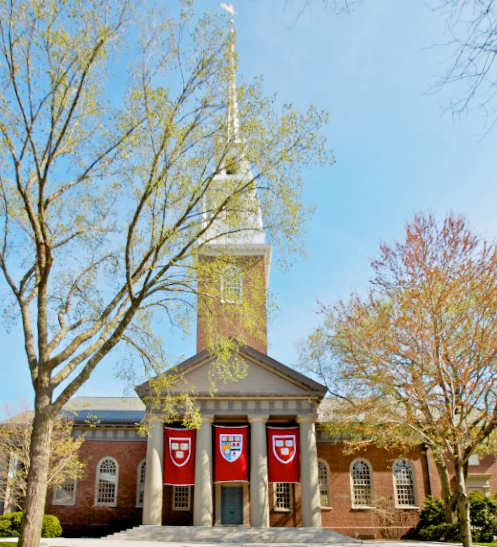






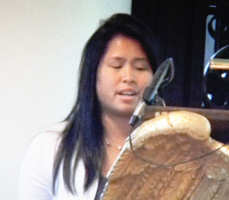
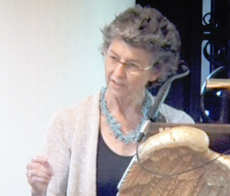

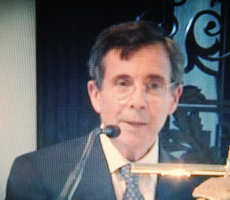
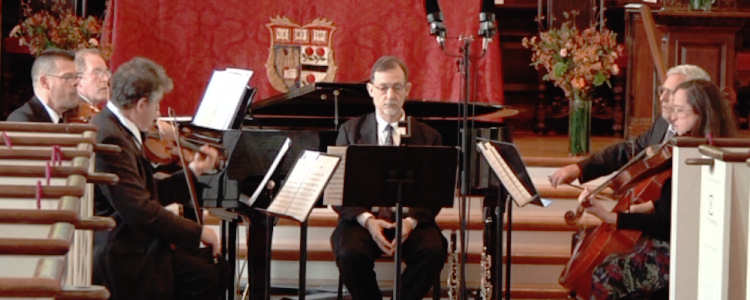
 Home page
Home page 